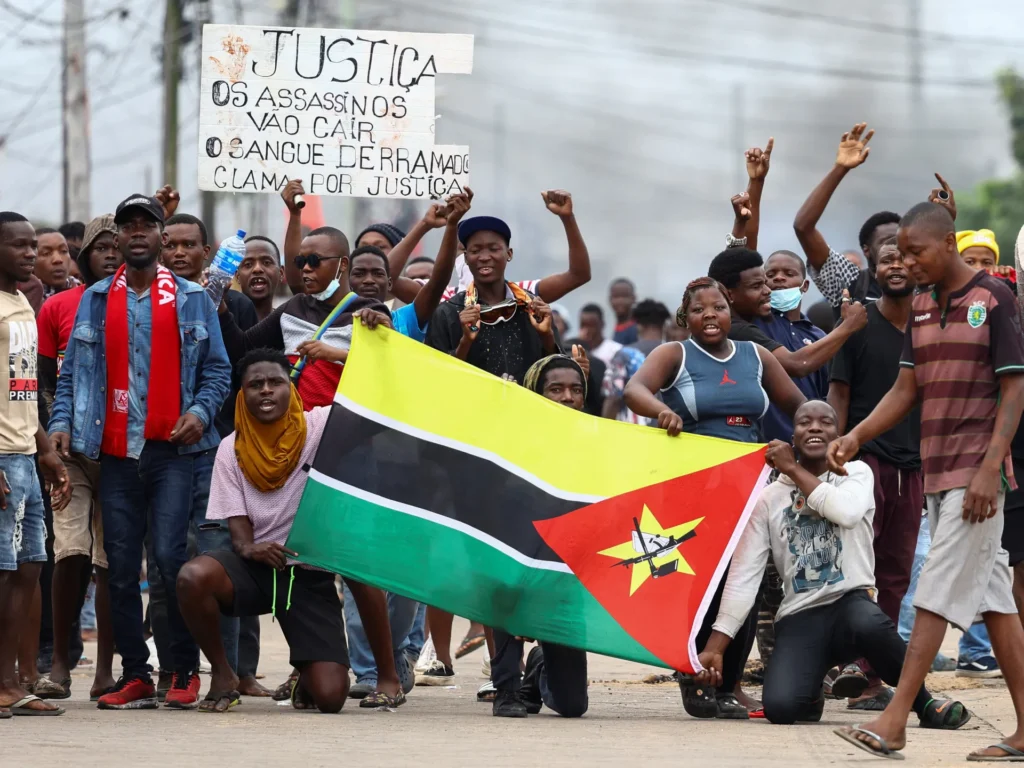Abstract
The 2007–2008 post-election violence in Kenya serves as a poignant lesson on the potential for conflict and upheaval following contested elections in Africa. With Mozambique currently grappling with similar election-related violence, examining Kenya’s experience provides crucial insights into conflict prevention, peace-building, and the role of governance in promoting electoral integrity. This article explores Kenya’s post-election crisis, highlighting causes, responses, and eventual reforms, while analyzing how Mozambique can apply these lessons. It focuses on the importance of strengthening electoral institutions, promoting dialogue, implementing inclusive reforms, and fostering accountability. The article aims to provide a comprehensive framework for Mozambique to navigate its current political crisis, reduce electoral tensions, and lay the groundwork for sustainable peace.
1 INTRODUCTION
Mozambique is currently witnessing violent reactions to electoral outcomes, an issue that mirrors Kenya’s 2007–2008 post-election crisis. Following Kenya’s highly disputed election results in 2007, the country plunged into violence that resulted in over 1,000 deaths and the displacement of thousands more.[1] The underlying causes included ethnic divisions, political manipulation, and institutional weaknesses, with significant implications for the nation’s stability and development. In Mozambique, similar patterns of electoral disputes and violence have surfaced, suggesting that learning from Kenya’s experience could help in averting a deepening crisis. This article analyzes key aspects of Kenya’s post-election violence and subsequent reforms, drawing lessons for Mozambique to address its challenges and foster a peaceful political environment.
2 BACKGROUND OF KENYA’S 2007-2008 POST-ELECTION VIOLENCE
Kenya’s 2007 elections were marred by allegations of rigging, leading to nationwide protests that escalated into ethnic violence. The conflict primarily stemmed from historical ethnic tensions and grievances exacerbated by electoral manipulation and mistrust in the electoral process.[2] Following the violence, Kenya instituted reforms under the National Accord and Reconciliation Act of 2008, including electoral, judicial, and security sector changes that aimed to prevent a recurrence.[3]
3 CAUSES OF POST-ELECTION VIOLENCE IN KENYA
The post-election violence in Kenya was attributed to several interconnected factors;-
- Ethnic Divisions. Political parties in Kenya often aligned along ethnic lines, with leaders exploiting these divisions for electoral gain.[4] The 2007 election brought these divisions to the fore, with violence erupting as various groups sought to assert their political dominance.
- Weak Electoral Institutions. The Electoral Commission of Kenya (ECK) as it was then was criticized for lacking transparency and impartiality, which led to widespread mistrust in the election results.[5] This institutional failure contributed to the perception that the election was rigged.
- Political Manipulation and Incitement. Politicians fueled ethnic tensions, with some allegedly orchestrating violence to influence electoral outcomes.[6] Such actions deepened the divisions within society and intensified the conflict.
4. POST-CRISIS REFORMS IN KENYA
In response to the violence, Kenya undertook significant reforms aimed at addressing the root causes of electoral violence;-
- Constitutional and Electoral Reforms. The 2010 Constitution introduced provisions to limit presidential powers, decentralize governance, and improve electoral transparency.[7] It also established an independent electoral commission tasked with overseeing elections fairly.
- Institutional Reforms. The judiciary and police were restructured to enhance accountability and prevent political interference.[8] This included vetting and retraining personnel to uphold professionalism and impartiality.
- Truth, Justice, and Reconciliation Commission. This commission was set up to address historical injustices and promote national healing.[9] It sought to provide a platform for victims and perpetrators to share their experiences and foster reconciliation.
5. MOZAMBIQUE’S CURRENT SITUATION AND LESSONS FROM KENYA
Strengthening Electoral Institutions
Mozambique can draw from Kenya’s experience by reinforcing its electoral bodies to ensure credibility and impartiality. As seen in Kenya, a weak electoral commission can exacerbate tensions, especially in a polarized environment. Mozambique should consider revising the mandates of its electoral institutions, ensuring they are independent and capable of overseeing free and fair elections.[10] By instituting measures such as transparent tallying processes and open communication, Mozambique’s electoral body can foster public trust and reduce the likelihood of contested results.
Addressing Ethnic and Political Divisions
Kenya’s crisis highlighted the dangers of ethnic-based politics, where leaders prioritize ethnic allegiances over national unity. Mozambique, with its diverse ethnic composition, risks similar divisions if political leaders continue to appeal to ethnic identities for support.[11] To prevent violence, Mozambique must promote policies that encourage inclusive politics, where leaders represent all ethnic groups. Educational campaigns that focus on national unity and the dangers of ethnic divisions could also help mitigate the influence of divisive politics.
Instituting Accountability Mechanisms
One of the critical elements in Kenya’s reforms was the establishment of accountability mechanisms to address impunity. By setting up independent institutions to investigate electoral violence, Kenya underscored the importance of justice and accountability. Mozambique could benefit from establishing a similar framework, allowing for the prosecution of perpetrators of election violence. Such mechanisms would deter potential instigators of violence and promote a culture of respect for the rule of law.
Implementing Inclusive Dialogue and Peace-Building Initiatives
Following the 2007-2008 crisis, Kenya engaged in various peace-building initiatives that promoted dialogue among conflicting groups. This approach fostered understanding and encouraged peaceful conflict resolution.[12] Mozambique can adopt similar initiatives, particularly at the community level, where inter-ethnic tensions may be high. Creating platforms for dialogue can facilitate better communication between political actors and communities, reducing tensions and fostering trust.
Political and Security Sector Reforms
Kenya’s reforms included restructuring the police and judiciary to enhance their professionalism and impartiality. Mozambique’s security sector has been criticized for partisanship, with allegations of police involvement in political violence. Reforms that emphasize neutrality and professionalism within the security forces could help Mozambique address these concerns. Such reforms should be coupled with training programs on human rights and conflict resolution to equip security personnel with the necessary skills for handling political conflicts.
Challenges to Implementation
Despite Kenya’s progress, the implementation of reforms faced several challenges, including political resistance and limited resources.[13] Mozambique is likely to encounter similar obstacles, especially from entrenched political interests that may view reforms as a threat to their power. Effective implementation will require strong political will, public support, and possibly assistance from international bodies.
The Role of Regional and International Organizations
The African Union (AU) and other regional bodies played a crucial role in mediating Kenya’s conflict. Mozambique could leverage similar support from regional and international organizations, which can provide mediation, resources, and technical support for reforms. Engaging these bodies can enhance Mozambique’s capacity to implement necessary changes and offer a platform for conflict resolution should the violence escalate.
Conclusion
Mozambique’s current electoral violence mirrors Kenya’s 2007-2008 post-election crisis in many ways, highlighting the importance of learning from Kenya’s experience. The Kenyan example underscores the need for strong, independent institutions, inclusive politics, accountability, and peace-building initiatives. Implementing these strategies in Mozambique can prevent further violence, promote national unity, and foster a political environment conducive to sustainable peace and democracy. While challenges are inevitable, Mozambique’s commitment to these reforms can pave the way for a peaceful and resilient society.
As the Head of Leadership and Good Governance Unit with Firdaous Initiative for Academic Excellence, this author is of the firm believe that Africa does not need another bloodshed and human sacrifice borne out of election disputes, our disagreement as a continent must be managed maturely, all stakeholders must ensure peace is a topmost priority in all their actions and inactions, all the recommendations should be adopted to avert another senseless lost of lives and properties.

FIAE Head of Leadership and Governance Unit
REFERENCES
Branch D and Cheeseman N, ‘Democratization, Sequencing, and State Failure in Africa: Lessons from Kenya’ (2009) 108(430) African Affairs 1
Burbidge D, ‘The Shadow of Kenyan Democracy: Widespread Expectations of Widespread Corruption’ (2015) 9(3) Journal of Eastern African Studies 407
Cheeseman N, Lynch G and Willis J, ‘Decentralization in Kenya: The Governance of Governors’ (2016) 54(1) The Journal of Modern African Studies 1
Lynch G, ‘Electing the ‘Alliance of the Accused’: The Success of the Jubilee Alliance in Kenya’s Rift Valley’ (2014) 8(1) Journal of Eastern African Studies 93
Mueller SD, ‘The Political Economy of Kenya’s Crisis’ (2008) 2(2) Journal of Eastern African Studies 185
Oucho JO, Undercurrents of Ethnic Conflict in Kenya (BRILL Press 2010)
[1] Cheeseman N, Lynch G and Willis J, ‘Decentralization in Kenya: The Governance of Governors’ (2016) 54(1) The Journal of Modern African Studies 1
[2] Mueller SD, ‘The Political Economy of Kenya’s Crisis’ (2008) 2(2) Journal of Eastern African Studies 185
[3] Ibid n1
[4] Branch D and Cheeseman N, ‘Democratization, Sequencing, and State Failure in Africa: Lessons from Kenya’ (2009) 108(430) African Affairs 1
[5] Ibid n2
[6] Ibid n1
[7] Burbidge D, ‘The Shadow of Kenyan Democracy: Widespread Expectations of Widespread Corruption’ (2015) 9(3) Journal of Eastern African Studies 407
[8] Ibid n1
[9] Oucho JO, Undercurrents of Ethnic Conflict in Kenya (BRILL Press 2010)
[10] Lynch G, ‘Electing the ‘Alliance of the Accused’: The Success of the Jubilee Alliance in Kenya’s Rift Valley’ (2014) 8(1) Journal of Eastern African Studies 93
[11] Ibid n7
[12] Ibid n10
[13] Ibid n1

